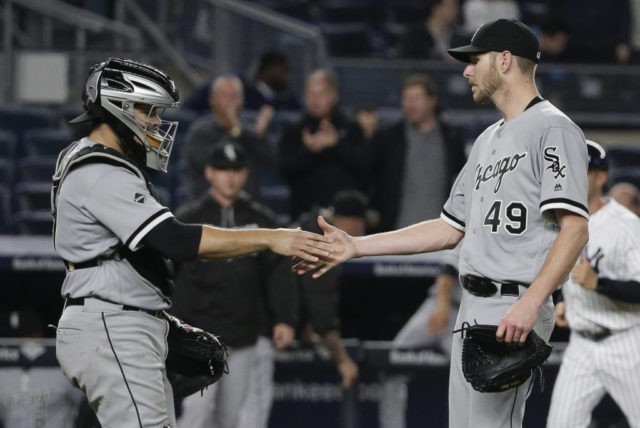Chris Sale’s demonstration against White Sox uniform policies came as just the latest protest by Chicago’s players.
Before Sale sliced up the team’s softball-style throwback uniforms to ensure he would not have to wear the unusual gear on Saturday, White Sox players partook in a demonstration against the peculiar clubhouse policies of the Seattle Mariners. And in Seattle, as on Saturday, Sale vocally objected to the policies of management, albeit in this case of the Mariners rather than the White Sox.
The protest stemmed from a new policy directing 60 percent of dues normally given to clubhouse attendants from players to the team instead. Sale and his Sox teammates felt that the Mariners intruded upon a relationship traditionally between players and attendants and grabbed a piece of the pie the franchise didn’t rate. The team says it merely manages the 60 percent directed its way.
Ken Rosenthal reports at Fox Sports:
Most teams allow the visiting clubhouse manager to handle dues as well as individual tips. The clubhouse manager uses the money to purchase food and other items for the players and redistributes a percentage of the tips to his assistants.
The Mariners’ policy allows [visiting clubhouse attendant Jeff] Bopp to receive 40 percent of the dues plus all of the tips, in addition to his salary from the club, [Mariners general manager Jerry] Dipoto said. The other 60 percent of the dues helps pay for food and the salaries of clubhouse assistants.
Players typically pay $50 a day in dues when on the road and tip above that. Dipoto said that the Mariners’ portion does not cover the team’s costs and that the club implemented the policy in part because it wanted to manage the hours of underage employees and their overtime.
Sale, who received a five-game suspension for cutting up the team’s uniforms on Saturday, protested the White Sox front office’s decision to limit clubhouse access to Adam LaRoche’s son Drake, which led to the first baseman/designated hitter’s retirement. The pitcher hung the player’s jersey in his locker for all to see after LaRoche’s retirement.
Like uniforms that become multiform through aggressive marketing and policies that undermine baseball as a game of fathers and sons, the clubhouse policy that bothers Sale and teammates clashes with tradition.
“Jeff [Bopp] walked them through the detail of what we’re doing,” Mariners general manager Jerry Dipoto told Rosenthal. “There has been some curiosity with other teams in the league, but nobody reacted the way the White Sox did. The fact that they decided to leave town without paying, clearly it’s their choice. They don’t have to. There’s no rule that says you must.”

COMMENTS
Please let us know if you're having issues with commenting.